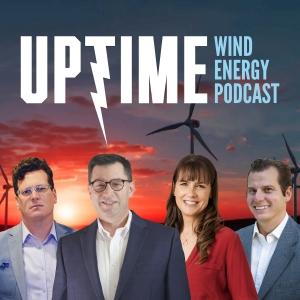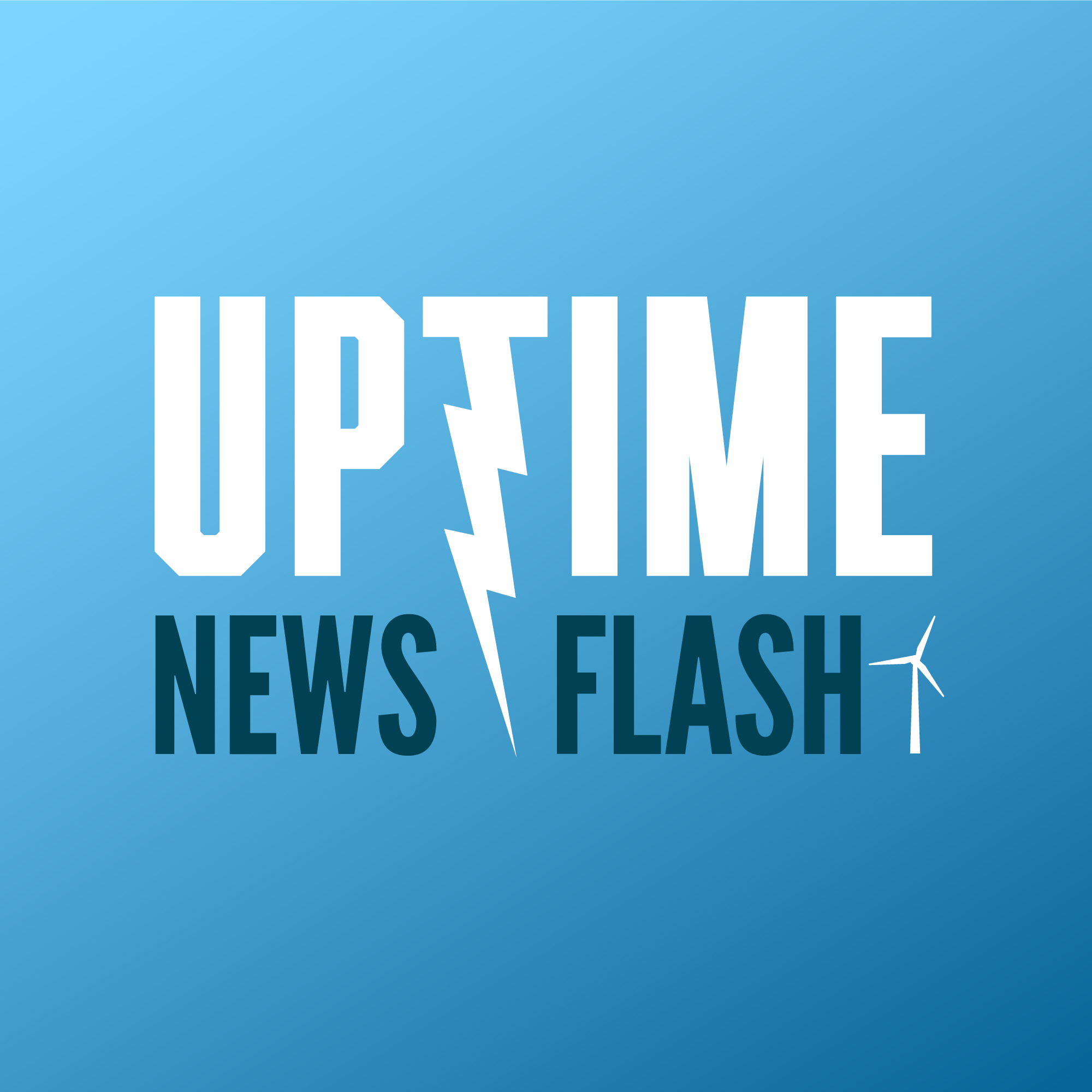The Uptime Wind Energy Podcast

Xcel Adds 4.2 GW to Midwest, €8 Billion EU Wind Push
In this week’s News Flash, Allen and Phil discuss Xcel Energy adding 4.2 GW of clean energy to the US Midwest, The European Investment Bank’s partnership with Intesa Sanpaolo to unlock up to €8 Billion for clean energy, and Empire Energy and The Herrick Corporation’s partnership to form an offshore wind venture.
Sign up now for Uptime Tech News, our weekly email update on all things wind technology. This episode is sponsored by Weather Guard Lightning Tech. Learn more about Weather Guard’s StrikeTape Wind Turbine LPS retrofit. Follow the show on Facebook, YouTube, Twitter, Linkedin and visit Weather Guard on the web. And subscribe to Rosemary Barnes’ YouTube channel here. Have a question we can answer on the show? Email us!
Pardalote Consulting – https://www.pardaloteconsulting.com
Weather Guard Lightning Tech – www.weatherguardwind.com
Intelstor – https://www.intelstor.com

Welcome to Uptime News Flash. Industry news, lightning fast. Your hosts Allen Hall, Joel Saxum, and Phil Totaro discuss the latest deals, mergers, and alliances that will shape the future of wind power. News Flash is brought to you by IntelStor. For market intelligence that generates revenue, visit www. IntelStor. com.
Excel Energy plans to add 4. 2 gigawatts of clean energy in the upper Midwest by 2030. The plan includes 3200 megawatts of wind, 600 megawatts of battery storage, and 400 megawatts of solar. This could reduce regional emissions by up to 88 percent compared to 2005 levels. The company will extend operations at two nuclear plants and has cut one planned gas plant.
The remaining gas plant will be hydrogen capable. Now, Xcel Energy notes that the wind power remains key, but solar deployment is lower than previously considered due to economic factors. Factors. Phil, this is an interesting approach by Xcel Energy that they’re really focused on wind. I was at a recent conference where a lot of wind operators said that their focus over the next couple of years will be on solar for a lot of their operations.
Philip Totaro: Well, and, and Xcel has been traditionally very solar focused but the fact that they would pivot to wind at this point themselves is reflective of the market dynamics for wind and price stabilization and in the merchant markets, as well as for utility power offtake agreements and the fact that they’ve Excel has committed to building more transmission in Minnesota North and South Dakota, Wisconsin, and, and even out into Michigan, that’s going to facilitate some of this capacity build out.
So, the fact that they’re kind of putting these plans in place and getting approval from the, the various state regulatory bodies to, to be able to build both the transmission and then, this wind solar and battery storage cap Capacity. That’s very impressive that, they’re, they’re going to be able to push forward with it.
It doesn’t obviously uncork any more than what they’ve committed to thus far again, because of the, the transmission constraints, but at least they’re, they’re committing to, starting to fund that process of, building out more transmission and modern transmission that will allow for more renewables to to achieve penetration on their their portion of the grid.
Allen Hall: Empire Energy Partners and the Herrick Corporation have formed a joint venture to enhance the US offshore wind supply chain capacity.
They will explore manufacturing components for fixed and floating offshore wind projects, including monopiles, transition pieces, secondary steel and towers. The venture combines Herrick’s steel production experience with Empire Energy’s EPC capabilities. This is fascinating, Phil, because we really haven’t seen this sort of partnership in the United States yet.
Over in Europe, this happens quite a bit. Will we see more of this sort of de risking, but at least trying to move forward on offshore wind?
Philip Totaro: I certainly hope so. And this is actually in direct response to them, being in line for contracts for some of the upcoming wind projects that we talked about last week on the Uptime Wind Energy podcast.
So, particularly in the northeast of the United States. So the fact that they You know, are, are moving forward with this partnership and the fact that it’s going to cover more of the domestic production of things like, like you mentioned, the transition pieces, secondary steel some foundation and tower elements, that’s, that’s great because a lot of that stuff was otherwise going to come from Europe or, or Asia.
For a lot of these U. S. based projects. So, the more we can domesticate and the more they can try to take advantage of the manufacturing tax credits that we have as part of the IRA bill that’s, that’s a good thing for domestic jobs and creating a domestic economy.
Tax base and supply chain over here.
Allen Hall: The European Investment Bank and Intesa Sanpaolo have launched an initiative that could unlock up to 8 billion euros in investment for the European wind industry. The EIB will provide a 500 million euro counter guarantee to Intesa San Paolo, enabling the creation of a 1 billion euro bank guarantee portfolio.
This will support the supply chain and power grid interconnection. for new wind farm projects across the EU. This initiative is part of the EIB’s 5 billion euro wind power package announcement at COP28 and is the first agreement under this package supported by InvestEU. Well, Phil, this is a way to kick off this InvestEU program with a really substantial Amount of euros being pushed into renewable energy.
Philip Totaro: And it’s coming at the, at a time when a lot of folks in the EU are sensing, this increased pressure from the Chinese trying to enter the market and saying, we need to do something to bolster. European companies with, with investment. So this is, as I’ve kind of complained about at various times on, on the podcast before this is something that is, has long been kind of overdue and, and necessary get your wallet out and, and start kind of putting money behind domestic production including, from, from this Italian bank where that has the potential to support.
Companies like Festus and, and frankly, even it could end up supporting companies like Ming Yang coming over but that’s also a situation where they’d be coming into the EU, creating jobs in the EU, playing by the EU’s rules by creating a factory here or there. A investment like this, frankly, goes a long way when a European company gets an order book, but they don’t have the cash on hand to be able to support, all the supply chain sourcing they need to do.
So this gives them guarantees to be able to get access to, the, the tooling, the parts, the, the components that they need to be able to do the manufacturing that’s going to allow them to keep capturing more order book and delivering on the order book they already have.






 Visit Podcast Website
Visit Podcast Website RSS Podcast Feed
RSS Podcast Feed Subscribe
Subscribe
 Add to MyCast
Add to MyCast